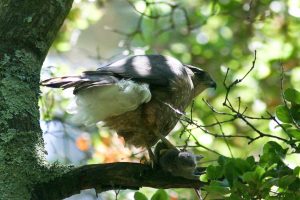
Not only are hawks and owls beautiful to see but they also provide essential environmental services for us by consuming rodent pests. Unfortunately each year hawks, owls, and other non-target animals (including pets and other wildlife) become sickened and die from exposure to rat poison. This is because mice and rats eat the rodenticide and then become sick and lethargic. Hawks and owls see an easy meal, but when they consume the poisoned rodent they too are poisoned. This secondary poisoning is harmful to our environment and fouls the entire food chain.
The Department of Pesticide Regulation explained it this way: “It’s true that all rodenticides are toxic to wildlife and should not be placed in areas where non-target wildlife have access to them. What’s unique about second generation anti-coagulant rodenticide (SGARs) is that rodents frequently eat more than a single dose of them, and the effects of that dose are often delayed for a few days. Meanwhile, the rodents may continue to eat more poison, resulting in a super-lethal dose that builds up in their tissues. When predators such as hawks or foxes eat these weakened or dead rodents, the dose may also be deadly to the predators. Incident reports conclude that SGAR products pose significant risks to non-target wildlife and that these risks are greater than those posed by other rodenticide active ingredients.”
Fortunately there are solutions. If your property has rodents, first remove their access to food. Second, seal any openings to your home, business, or other buildings. Then use appropriately sized snap traps inside a bait box. Or hire a company that does not use rodenticides. There are several companies in the San Francisco Bay Area including The Hit Men, Pestec, Sieg’s Abatement Service and Rat Patrol.
In 2021, a California state law went into effect banning the use of second-generation anticoagulant poisons except in certain public-health situations. Bait boxes are required to list their ingredients so we can tell if they contain prohibited poisons. If you spot a bait box with a banned SGAR ingredient—or a box that doesn’t indicate which ingredients it uses—please report it to your county Agriculture Commissioner.
What can you do?
Clean up – Remove any sources of food or water. This includes removing bird seed, ripe fallen fruit, pet food, and other food sources. Also remove materials that can be used for rodent nesting including shredded paper. Put an old shower curtain under bird feeders for easy cleanup and take these indoors at night.
Exclusion – Seal up any entry holes or access points near pipes, doors and windows where mice or rats can enter a building. Seal any holes bigger than a dime. Put an old shower curtain under bird feeders for easy cleanup and take these indoors at night.
Spread the Word – Please share information from Raptors are the Solution (RATS) with your neighbors, workplace, and local businesses. RATS offers educational resources and free downloadable brochures, flyers and advocacy materials.
Monitor and Report — If you find bait boxes containing banned ingredients or not listing the specific poisons they contain, report it to your county Agriculture Commissioner. You can find a list of banned (and still-legal) poisons on the RATS web site.
- Alameda County: Cathy Roache, (510) 670-5232 or by web form
- Contra Costa County: Matthew Slattengren, (925) 608-6600 or agcommissioner@ag.cccounty.us
- San Francisco County: Cree Morgan, call 311
Contact the Manufacturers — Contact these three companies and ask them to stope sellingthese harmful products.
- Reckitt Benckiser Inc (maker of D-Con, Fleeject and Mimas products)
P.O. Box 225, 399 Interpace Parkway, Parsippany, NJ 07054-0225
Attn: Customer Service - Spectrum Group (Hot Shot products)
P.O. Box 142642, St. Louis, MO 63114-0642 - Liphatech Inc (Generation, Maki and Rozol products)
3600 West Elm Street, Milwaukee, WI 53209
More information on rodenticides from S.F. Department of the Environment:
https://sfenvironment.org/
https://sfenvironment.org/
More information from the U.S. Environmental Protection Agency:
https://www.epa.gov/
https://www.epa.gov/
